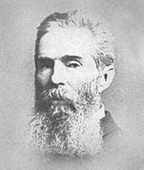
- Details
- Category: Recommended Reading Recommended Reading
- Published: 14 October 2012 14 October 2012
- Hits: 8574 8574

Herman Melville (1818-1891) published a number of poems related to the War Between the States. His Battle Pieces and Aspects of the War was published in 1866. A particularly interesting poem is "Lee in the Capitol." In this poem Melville "recreates" a scene--where Lee appears before a Reconstuction Committee of Congress (spring of 1866). Melville took what he called "poetical liberty" and wrote a poem about this event, and in the poem "recreates" Lee's testimony.
One of the most interesting aspects of the poem is where Melville poignantly points out the relationship (conceptually and principially) between George Washington and Robert E. Lee.
The key lines read as follows:
Who looks at Lee must think of Washington
In pain must think, and hide the thought,
So deep with grievous meaning it is fraught.
Indeed, when one "looks at Lee" one sees Washington, for Lee did what Washington would have done if Washington had been living in the 1860s: he would have defended his homeland against invasion. Lee was committed to the Union, and wanted to see it thrive and prosper. Lincoln had even asked Lee to play a leadership role in the Union army. However, once Lincoln raised troops for the purpose of invading the South, there was no real question of what a principled Virginian like Lee had to do. Lee, as he ought, chose to defend his land and family and neighbors against foreign invasion. I suspect that in the line above, "In pain must think, and hide the thought," Melville is closing in on a difficult reality: If there is that much similarity between Washington and Lee, then what does it mean to be an American? That is, if Lee was simply being faithful to the principles and realities of constitutional government, why would Lincoln invade Virginia? Is it possible that Lee was actually right? And if that is the case, it is tempting (and perhaps almost existentially necessary, in Melville's words) to "hide the thought." For, if Lee--and not Lincoln--was the true heir of the best of American thought and principles, the implications are quite grievous indeed.